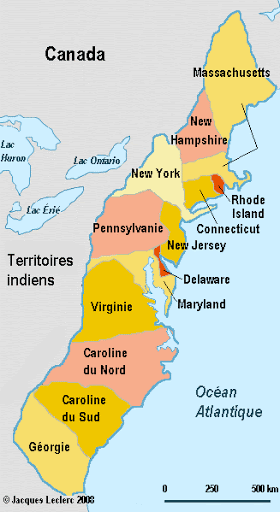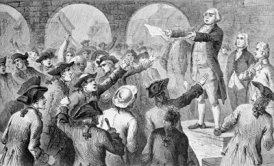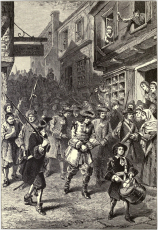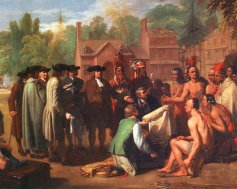Les colonies britanniques
en Amérique
Fondées entre 1607 (Virginie) et 1732 (Géorgie), les treize colonies britanniques d'Amérique connaissent une croissance démographique fulgurante au cours du XVIIIe siècle.
De 250 000 vers 1700, la population totale atteint 2,5 millions d'habitants en 1775. Cette croissance est liée à une émigration très importante et une démographie nettement plus dynamique qu'en Europe (mortalité plus faible et natalité plus élevée).
Le régime politique adopté par les colonies est souvent le même : un gouverneur anglais est nommé par le roi ou par les grands propriétaires terriens, il est aidé par un conseil d'administration. Au temps des premières fondations, ce gouverneur dirige la colonisation et l'organisation du territoire. Ses pouvoirs vont s'élargir progressivement : il apporte son approbation à chaque loi, nomme les juges, commande la milice et peut dissoudre l'assemblée. Chaque colonie a une assemblée représentative qui vote les lois, le budget et les impôts, mais bien sûr, seuls les propriétaires terriens ont le droit de vote. Le pouvoir législatif des colonies, confirmé par le roi, reste inférieur à celui de la métropole, donc, les lois anglaises priment sur les lois « américaines ».

L'agriculture est une option décisive prise par les colons : ils fondent une société paysanne unique en Amérique à cette période (il n'y a pas d'équivalent au Canada français ni en Amérique espagnole). Les conditions naturelles se prêtent à l'implantation de cultures vivrières européennes auxquelles vont s'ajouter le tabac. Les cultures tropicales de la canne à sucre et du coton s'implantent dans les colonies du sud. On assiste à la création d'une agriculture de plantations qui repose sur le travail des esclaves noirs africains.
Le développement commercial des treize colonies est spectaculaire mais reste soumis à la Grande-Bretagne qui veut conserver le contrôle de tous les échanges. Les importations viennent en grande majorité d'Angleterre, d'Irlande ou des Antilles britanniques (Jamaïque, Barbade). Les exportations prennent des destinations différentes suivant la nature des produits : les productions du Sud (tabac, coton, sucre) arrivent dans les ports d'Angleterre, alors que les colonies du Nord, qui produisent des biens comparables à ceux de la métropole, fournissent et nourrissent les colons et esclaves des Antilles anglaises.
C’est au cours du XVIIIe siècle que le schéma économique diverge entre le Nord, qui adopte le comportement d'un état autonome ayant perdu ses caractéristiques coloniales, et le Sud, qui présente une économie coloniale tropicale complètement dépendante de la métropole. Cet aspect particulier du commerce extérieur des treize colonies est certainement l'une des clefs pour comprendre la rupture avec la Grande-Bretagne en 1775.
Histoire de la Caroline du Nord
De 1663 jusqu’à 1665, le roi d'Angleterre, Charles II, concéda à une compagnie de huit nobles anglais les colonies allant de la Caroline du Nord jusqu’à la Floride, en leur octroyant tous pouvoirs de colonisation et de gouvernement et en ne limitant pas ces concessions à l’Ouest.
Les lords propriétaires s'efforcèrent d'y attirer des colons par l'appât de la liberté religieuse et de l'exemption de taxes, en tous les cas pendant les premières années. Ils gouvernaient leur province par l'intermédiaire d'un délégué, assisté d'un conseil de douze membres, dont six nommés par ce délégué et six par les colons. Ces derniers reçurent en outre le droit de nommer des représentants, sans l'assentiment desquels aucune taxe ne pourrait être établie dans la colonie.
C’est en 1669 que se réunit la première assemblée de ces représentants.
L'année suivante, les propriétaires essayèrent d'appliquer une constitution rédigée par le philosophe Locke et qui établissait une sorte de régime féodal extrêmement compliqué, contre lequel les colons ne cessèrent de protester.
Ces démêlés continuels entre la population et les gouverneurs, ajoutés à la détestable administration de ces derniers et aux luttes fréquentes avec les Indiens, retardèrent longtemps les progrès de la colonisation.
Finalement, les propriétaires vendirent à la couronne les droits qu'ils tenaient de la concession et la Caroline fut divisée en deux provinces royales, la Caroline du Nord et la Caroline du Sud.
La première ne comptait encore à cette époque que 13 000 habitants. Bientôt, les émigrants arrivèrent en grand nombre : Écossais, Irlandais, protestants d'Angleterre et d'Allemagne, presbytériens, quakers, venant directement d'Europe ou des provinces britanniques déjà formées sur la partie septentrionale de la côte d'Amérique, Virginie, Pennsylvanie, New York, Massachusetts.
Les nouveaux colons s'établissaient dans l'intérieur de la province, remontant les rivières et couvrant le pays de plantations disséminées jusqu'aux monts Appalaches.
En 1765, la Caroline du Nord se joignit aux autres colonies dans la résistance à l’impôt du timbre, et en 1771 éclata contre l'autorité royale une véritable insurrection, que le gouverneur Tryon réprima en battant un corps de milices caroliniennes à Alamance River.
En 1775, les habitants du comté de Mecklembourg déclarèrent leur indépendance, devançant ainsi d'une année la résolution du Congrès continental de Philadelphie.
La Caroline du Nord fut l'un des derniers parmi les treize États de l'Union primitive à accepter la constitution fédérale de 1787.
Elle comptait alors, d'après le recensement de 1790, près de 400 000 habitants, dont 288 000 Blancs et 100 000 esclaves, le reste composé de Noirs libres. La population augmenta lentement pendant la première moitié du XIXe siècle, sous le régime de l'esclavage. Elle s'élevait en 1850 à 860 000 habitants, et à 992 000, dont 331 000 esclaves, en 1860, au moment où éclata la guerre de Sécession.
De 1860 à 1870, période de ruine et de dépopulation pour tous les États du Sud, l'augmentation fut plus lente encore, mais en 1880 était atteint le chiffre de 1 400 000 habitants. Ce chiffre comprenait 867 000 Blancs et 533 000 Noirs.
Jusqu’au milieu du XVIIe siècle, les Américains se considèrent encore comme des Anglais d'Amérique.
De la Géorgie au Massachusetts, ils n'ont pas conscience d'appartenir à une seule et même société. Pourtant, les 13 colonies découvrent qu'elles peuvent avoir des intérêts communs.
D’ailleurs, pourquoi les colons anglais d'Amérique du Nord renonceraient-ils aux bienfaits de l'empire ? Certes, ils ont quitté les îles Britanniques pour faire fortune de l'autre côté de l'Atlantique ou pour échapper aux discriminations dont souffraient les dissidents religieux. De la Géorgie au Massachusetts, en passant par la Virginie et New York, ils n'ont pas conscience d'appartenir à une seule et même société.
Les planteurs du Sud, qui vivent de la culture du tabac, de l'indigo et de plus en plus du coton, sont des amateurs de bons vins et de fêtes galantes. Anglicans, donc soumis à l'autorité morale et religieuse du roi d'Angleterre, ils se soucient peu du salut de leur âme.
Les marchands du Nord, eux, commercent avec l'Europe et les Antilles. Ils sont les héritiers des puritains austères, enfermés dans l'éthique du travail. Dans l'Ouest, c'est-à-dire entre l'océan et les Appalaches, les défricheurs affrontent « le péril indien » et détestent les gentilshommes et les capitalistes du bas pays. Mais tous éprouvent un attachement sentimental pour l'Angleterre. La culture, la langue, l'histoire les unissent au vieux pays. Et même les Allemands, les Hollandais, les Suédois qui ont choisi, eux aussi, de s'établir en Amérique savent que l'Empire britannique les protège. Au milieu du XVIIIe siècle, les Américains sont donc des Anglais d'Amérique et ils tiennent à le rester.
D'autant que l'ennemi héréditaire vient d'être battu.
En effet, au terme de la guerre de Sept Ans, qu'on appelle ici la guerre contre les Indiens et les Français (1754-1763), la France a perdu le Canada. Elle ne menace plus la vallée de l'Ohio et la région des Grands Lacs. Ses alliés, les Indiens algonquins, iroquois ou sioux, sont repoussés de l'autre côté des Appalaches. Un vaste territoire est désormais ouvert à la colonisation. Les planteurs rêvent de terres nouvelles et fertiles ; les marchands et les pionniers, des bonnes affaires qu'ils feront dans l'Ouest.
Le traité de Paris de 1763, qui met fin à la guerre et réconcilie, après trois ans de négociations, la France et la Grande-Bretagne, permet à cette dernière, toute puissante sur le territoire, d’imposer de nouvelles lois aux colons afin de contenir les appétits fonciers de ces derniers.
La Proclamation du 7 octobre 1763 crée un Territoire indien à l'ouest des Appalaches. « Les nations ou tribus indiennes [...] ne devront être ni maltraitées ni dérangées dans nos territoires qui n'ayant été ni cédés à nous ni achetés par nous leur sont réservés comme terrains de chasse. » Et pour dissiper tout malentendu, la Proclamation précise : « Nous interdisons formellement à tous nos sujets bien-aimés sous peine de nous causer du déplaisir d'acheter, de coloniser ou de prendre les terres ainsi réservées sans avoir obtenu une autorisation spéciale. »
Bien sûr, les colons poussent de hauts cris.
Alors qu’ils ont vaillamment combattu les Français, comme l'a fait notamment George Washington, et qu’avant cela le roi avait promis et encouragé l'expansion vers l'Ouest, voilà qu'une mesure autoritaire, pour ne pas dire tyrannique, les empêche de tirer parti de la victoire ! D’autant que, bien évidemment, cette mesure profitera aux commerçants de la métropole, proches du pouvoir, âpres au gain, à l'abri des dangers que recèlent ces terres lointaines.
Et il y a pire encore. La guerre a coûté cher. L'Angleterre, qui guerroie aux Indes comme dans le Nouveau Monde, a besoin d'argent. Comment trouver de nouvelles ressources ? L’impôt sur le sucre (le Sugar Act) du 5 avril 1764 répond à l'urgence. Les droits sur les mélasses étrangères sont doublés ; les textiles, le café, l'indigo non britanniques sont eux aussi frappés de droits plus élevés. Pour éviter la fraude, les contrevenants seront systématiquement pourchassés. Et comme ces impôts ne suffisent pas à remplir les coffres royaux, une autre taxe sera imposée l’année suivante : l’impôt sur le timbre.: "Pour chaque peau ou morceau de vélin ou de parchemin, pour chaque feuille ou morceau de papier, sur quoi sera rédigée, écrite ou imprimée une déclaration, une requête, une défense, une contre-attaque, une objection ou toute autre forme de plaidoirie [...] un droit de timbre de 3 pence" sera perçu. Et bien entendu, l'application de la mesure ne supportera aucune exception ni aucune indulgence.
Cet impôt supplémentaire met le feu aux poudres.
La métropole a beau dire que ces impôts sont nécessaires pour défendre les colonies, les colons ne sont pas convaincus. Ils savent que cet argent est destiné aux intérêts de l’empire et non à la survie des colonies, d’autant que, depuis le début, ils n’ont personne pour les représenter au Parlement lorsque les lois sont votées.
Le Parlement prend le risque d’une rébellion et maintient les taxes autant par besoin financier que pour garder les colons sous son autorité. Sinon, ce serait le début d’un système politique indépendant qui rejetterait l’illégalité, l’arbitraire, donc la tyrannie, alors qu’en vérité, la seule chose qui maintient encore les colons sous le joug britannique, c’est leur fidélité et leur loyauté à la couronne.
Ce qui n'empêche pas quelques contestataires de protester violemment et de former soit des groupuscules de résistance, appelés "Régulateurs "soit des associations de défense baptisés "Les Fils de la liberté".
L’impôt sur le timbre est abrogé en mars 1766. Les colons ont remporté la victoire. Chemin faisant, ils ont découvert que les treize colonies pouvaient avoir des intérêts communs. Les planteurs, les commerçants et les pionniers de l'Ouest envisageraient-ils de partager le même avenir ? Peut-être.
On pourrait penser, toutefois, que, des deux côtés de l'Atlantique, on a compris qu'il ne fallait pas aller trop loin, qu'on a tiré les enseignements de la crise de 1765. Erreur. Les mêmes causes entraînent les mêmes effets.
Le nouveau premier ministre, William Pitt, affronte la même situation que ses prédécesseurs : l'argent manque. Une fois de plus, le gouvernement part à la recherche de nouvelles rentrées. Imposer la métropole, oui bien sûr, à condition que les colonies assument leurs responsabilités et ne ressemblent pas à un paradis fiscal.
De nouvelles taxes sur l’importation du verre, du plomb, des teintures, du thé et du papier son votées en 1767. Le pire, c’est que ces taxes ne suffisent même pas à renflouer les caisses du royaume, et pourtant, en Amérique, on crie à l'injustice, avec les mêmes arguments que deux ans plus tôt. Cette fois-ci, les colons savent ce qu'il faut faire, ce qu'il faut écrire, ce qu'il faut réclamer. Pamphlets, articles de journaux, boycottage des marchandises anglaises, démarches politiques, voilà les armes les plus efficaces. Benjamin Franklin lui-même, qui appartient au camp des modérés, n'hésite pas à soutenir que les colonies disposent des mêmes droits que les Écossais. À ses yeux, les assemblées législatives des colonies possèdent les mêmes libertés que le Parlement de Londres. Ce qui ne limite en rien l'allégeance à la Couronne.
Boston devient le centre principal de la résistance. Certes, la Virginie produit une part importante de la richesse américaine, mais elle est formée de plantations, éloignées les unes des autres. Au Massachusetts, en revanche, survit la tradition des assemblées populaires qui pratiquent une relative démocratie directe, et l'assemblée législative de la colonie est peuplée d'avocats éloquents, toujours prêts à prononcer des discours enflammés. Les Fils de la Liberté sont de nouveau à l'avant-garde du combat. Des comités de correspondance font circuler les informations et les protestations d'une colonie à l'autre. Face à l'ennemi commun, les colons apprennent à faire cause commune.
Les politiques ne parviennent pas à éviter les violences. Inévitablement des incidents éclatent, qui opposent des colons aux troupes royales. Ils ne sont pas d'une gravité extrême, mais, rapportés d'une colonie à l'autre, exagérés à dessein, ils marquent les esprits.
Le pire survient le 19 avril 1775. À Lexington, tout près de Boston, des miliciens - des colons en armes - font face aux troupes royales. L'affrontement dégénère en une véritable bataille qui se poursuit dans la ville de Concord. C'est le début d'une insurrection.
Le 10 mai, un deuxième Congrès continental se réunit à Philadelphie. Il prépare la guerre. Thomas Paine, un immigrant anglais récemment débarqué en Amérique, publie en janvier 1776 son pamphlet qui a pour titre "Le Sens commun". Il appelle à l'indépendance des colonies, dénonce la tyrannie du roi George III, proclame : « En Amérique, la loi est souveraine. »
L'une après l'autre, les colonies se rallient à l'idée de l'indépendance. Un comité, dans lequel siègent Thomas Jefferson et Benjamin Franklin, est chargé de rédiger une déclaration solennelle, qui est finalement adoptée le 4 juillet. Un deuxième comité élabore un projet de traité qui sera proposé à la France - l'ennemi héréditaire de l'Angleterre. Un troisième comité tâche de définir une constitution commune aux nouveaux États.
Ce n'est pas une révolution nationale. Des colonies, devenues des États, décident de s'unir. Ils ne forment pas encore une nation. Il faudra attendre plus de 80 ans, et les conséquences de la guerre de Sécession 1861-1865, pour que l'on puisse justifier le trait d'union qui lie le mot États et le mot Unis. Ce n'est pas non plus une révolution sociale, qui mettrait aux prises les « damnés de la terre » américains et les riches marchands d'Angleterre. Quant aux esclaves noirs qui triment dans les champs du Sud et dans les ateliers du Nord, ils n'ont pas vocation à recouvrer la liberté ni à bénéficier des droits identiques à ceux des Blancs. C'est avant tout une révolution à l'anglaise. Les Américains restent des Anglais. Ils défendent les libertés anglaises, telles qu'ils les comprennent. À leurs yeux, l'Angleterre a cessé de respecter ses propres principes. L'indépendance permet de les maintenir de l'autre côté de l'Atlantique. En un mot, les Américains de 1776 estiment qu'ils sont plus anglais que les Anglais. Ils sauvent l'âme de l'Angleterre en se séparant de la métropole. Voilà pourquoi ils ont pris le pouvoir.




Par Valérie Gay-Corajoud






